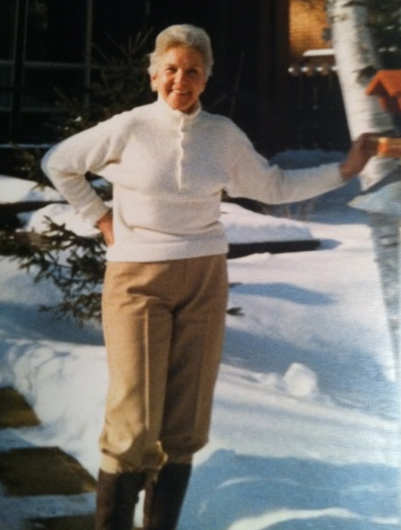On All Souls' Day, remembering a vivid life, well-lived
Next week brings Halloween, generally seen only from a secular perspective. But for Christians, Halloween is also the Vigil of the Feast of All Saints (Nov. 1), followed by the Feast of All Souls on Nov. 2. The former remembers and commemorates the Christian saints – men and women who have been recognized for heroic virtue or martyrdom. The latter remembers those dead who haven't been proclaimed saints. It is a day to pray for the dead, tend their graves and recollect the joys they brought to our lives.
Getting older means having more souls to pray for. This year I feel most acutely the loss, just two years ago, of my maternal grandmother, Anita Betzen. I dream about her often and sometimes have to remind myself that I can’t pick up the phone to call her.
Anita or “Nana,” as I called her, was a remarkable woman whose history reads like dramatic fiction. She was Estonian but born in the wilds of Siberia in 1920; her father had gone to work as an engineer on the Tran-Siberian Railway. Those were the days of the Russian civil war, when the Reds and Whites were engaged in bloody fighting. My great-grandfather sided with the Whites and found himself imprisoned several times because of this. After being released by the Reds in 1920, his family held a celebration. The night after the party he died of a heart attack. Nana wouldn't be born for another month.
Shortly after her birth, her family moved back to Estonia, where Anita grew up in relative tranquility. When she around 20, the Reds would strike again, as Communist Russians took over Estonia. Nana's tales of those days were a reminder of the continuing relevance of our Third Amendment – her family's house was appropriated by a Russian military officer who lived in the already crowded house. She always made a point of noting that he was rude.
Nana's brother-in-law was able to secure German passports for the family, and they caught the last train out of Estonia with what they could carry on their backs. In Germany, they found themselves refugees in country beholden to another sick ideology. The invasion of Estonia and Nana's escape meant she had to give up her study of medicine. In Germany, the conservatory to which she was offered a scholarship was blown apart by a bomb, thus ending her dreams of being a professional pianist. Undeterred, she turned to her other talent – speaking seven languages – and translation.
She survived the war, married a young German and started a family in Stuttgart. Post-war Germany was a bleak place, and when opportunity beckoned in Canada, the family made the journey to a new home.
This was all long before I existed, but it was the history and texture that formed Nana’s character – a character I miss deeply and daily. Never in our 30-plus years together did Nana betray a hint of bitterness at the suffering she’d experienced, or the many dreams that she had to give up. Indeed, she had a joy for life that belied those circumstances. Even in her final illness she was quick to laugh and easy to smile. It is a lesson my generation could take to heart.
And she lived a life that pursued and made concrete the true, the good, and the beautiful. She loved good music, good food, good conversation, and anything that was beautiful. I can still see her swaying to a Bach concerto, her eyes closed, being swept up by the music. Long after most of us had finished our meals, she was still savoring morsels of food, laughing at herself. Good conversation was her lifeblood. Thought I was nearly 60 years younger, she spoke to me as a friend; she was interested in my life and ideas and freely expressed hers back to me.
Finally – and this is a lesson that I need to be reminded of constantly – Nana showed me that a life need not coincide with power or wealth to be great and rich. She showed that class and taste are more a state of mind than an economic achievement. As Anna Nussbaum Keating has written, we too often “equate an ordinary life with a failed one.” Nana’s life put that idea to lie.
Her 91 years were filled with suffering, for sure, but also with joy, goodness and richness. Nana’s irrepressible joy demonstrated that we are not defined by our sufferings and struggles nor by our success and achievements, but by the beauty and goodness that we bring to bear on the world and the relationships we cultivate.
As we near the Feast of All Souls, for all these things that Nana taught me and, more importantly, for what she was for me and so many others, I miss Nana in a very particular way.
See what new members are saying about why they donated to Bridge Michigan:
- “In order for this information to be accurate and unbiased it must be underwritten by its readers, not by special interests.” - Larry S.
- “Not many other media sources report on the topics Bridge does.” - Susan B.
- “Your journalism is outstanding and rare these days.” - Mark S.
If you want to ensure the future of nonpartisan, nonprofit Michigan journalism, please become a member today. You, too, will be asked why you donated and maybe we'll feature your quote next time!


 A RICH LIFE: Anita Betzen fled two European nations but never let setbacks quench her love of life. (Courtesy photo)
A RICH LIFE: Anita Betzen fled two European nations but never let setbacks quench her love of life. (Courtesy photo)